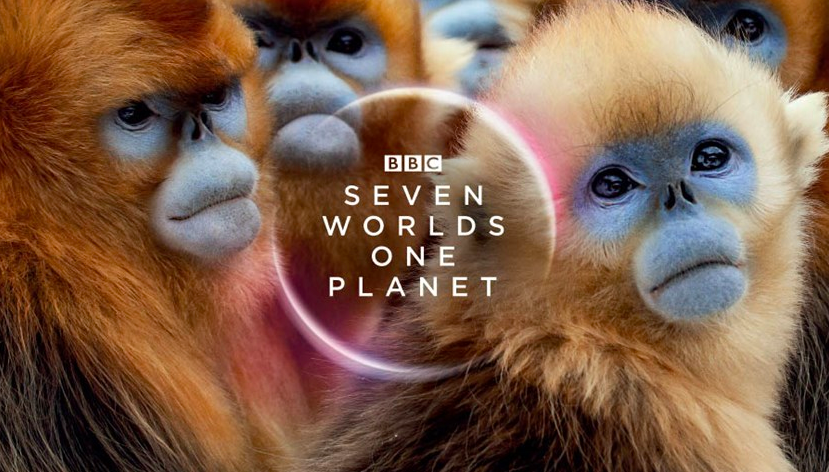'Seven Worlds, One Planet' premieres on BBC Earth
Updated | By Breakfast with Martin Bester
'Seven Worlds, One Planet' tells unknown, unseen, and unexpected wildlife stories, while it also uncovers the fundamental truth about what makes each one of our seven continents unique.

Breakfast with Martin Bester sat down with the executive producer of 'Seven Worlds, One Planet', Jonny Keeling. The remarkable series is set to premiere on BBC Earth, DStv channel 184, on Sunday, 29 March 2020.
Introduction to the Series:
Millions of years ago, incredible forces ripped apart the Earth’s crust, creating seven extraordinary continents. 'Seven Worlds, One Planet' - presented by Sir David Attenborough, will reveal how each distinct continent has shaped the unique animal life found there. This series will feature remarkable, new animal behaviour from all the continents, including the baking plains of Africa and the frozen waters off Antarctica. In Asia, the biggest of all continents, the show will showcase life at the extremes, whilst in Europe, surprising wildlife dramas hidden right alongside us will be revealed.
The series will celebrate the diversity of life on each of these continents, but also feature the many challenges faced by animals in a modern world dominated by humanity. By telling unknown, unseen, and unexpected wildlife stories, the show will uncover the fundamental truth about what makes each one of our seven worlds unique.
An interview with Jonny Keeling, Executive Producer:
How does 'Seven Worlds, One Planet' move forward from previous BBC Natural History Unit series?
There are, of course, echoes of series like 'Planet Earth II' and 'Blue Planet II' because they were great successes, but 'Seven Worlds, One Planet' is very different in several ways. First of all, this is the biggest series of biodiversity ever produced. The variety of life on earth is at risk so we’ve taken a big step forward in featuring these threats to our planet. So in the Antarctic episode, we have a story about climate change, but you will see it, it's not just mentioned. You will see how climate change is impacting animals and it is intended to be visual and emotional. Then we have a story about the historic damage done by whaling, which you would expect to be distressing but which actually tells a story of a positive reversal in recent years. Either way, I would say at least one, often two sequences within each episode have a focus on biodiversity and the loss of biodiversity.
We also frame everything in terms of geology. We start off by saying 200-million years ago there was one supercontinent called Pangea that broke apart. That had a significant impact on the diversity of life on Earth because if there was one great big, homogenous continent, you wouldn't have the incredible diversity that we do. That geology is in every episode: we will learn about mountain formations, about continents that crashed together and how that impacted the animals that live there. We've never featured this kind of geology before and it helps to give - almost literally - a backbone and a framework to those stories.
We’ve never broken the planet down by continents before and what's nice about that is we all belong to a continent. We don't all come from a mountain or a jungle or a desert, which is the previous way we've broken down the planet. This gives us a sense of belonging and the sense of a tangible place. It will make viewers feel closer to the stories they are watching.
This series has got new species, new behaviours, new animals that people won’t have seen, and places and locations that we've never been to before. We've filmed them in new ways as well. We've been using a lot of drones and though drones aren't brand new, in the last couple of years, during the lifetime of this project, they've come on massively in terms of the quality of image that you can get, the time that they can fly, how quiet they are and how much animals are able to ignore their presence. It has given us unusual, interesting angles and behaviours that couldn't be captured any other way.
It means that we have animals that you might have seen before, like a polar bear, but they're doing things you've never seen them do or they are in places that they've never been seen before. I'm a biologist by training and I have worked making TV shows for 25 years – my team have come to me with animals in this series that I’ve never even heard of, let alone seen or known what they do.
'Seven Worlds, One Planet' premieres on BBC World and @MartinBester spoke to the Executive Director, John Keeling https://t.co/ctNXS0GtYD.#JacaBreakfast pic.twitter.com/G41sW3D5JZ
— JacaBreakfast (@JacaBreakfast) March 27, 2020

Show's Stories
-
VIDEO: Must-see movies turning 50 in 2025!
What do you mean 1975 was 50 years ago?!
The Drive with Rob & Roz an hour ago -
WATCH: What happens to your body during brain freeze?
Does brain freeze effect your brain at all?
The Drive with Rob & Roz 2 hours ago